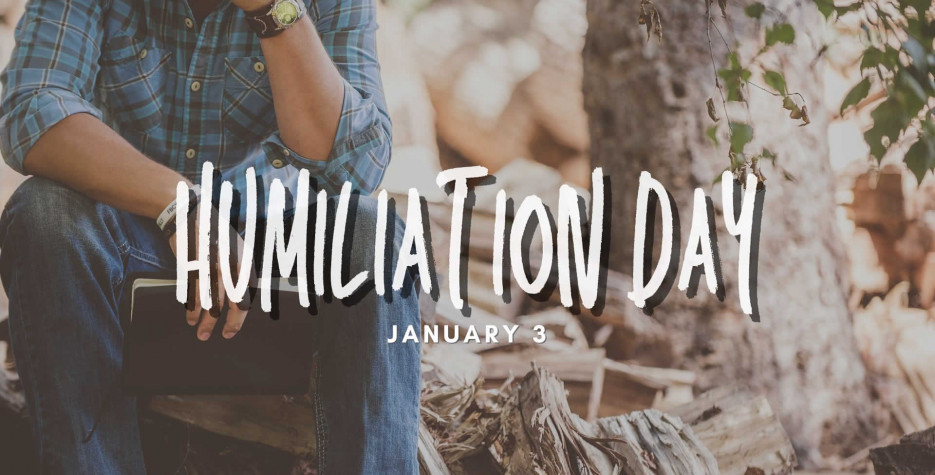About Humiliation Day
What is Humiliation Day?
As the calendar flips to January 3rd, a rather unusual observance takes place in the United States known as Humiliation Day. While it might seem an odd choice for a day of recognition, this day provides an opportunity to reflect on the nature of humiliation, its effects, and the importance of empathy and understanding in our interactions.
Unlike its literal meaning, it is not a day to humiliate one another or propagate hatred. It is rather a day to lay down our pride and become humble in front of a higher power or other people.
Humiliation Day encourages contemplation about the impact of humiliation on individuals, emphasizing the significance of treating others with dignity and respect. Though not an occasion for reveling in embarrassment or shame, it serves as a reminder to foster a culture of kindness and empathy.
Humiliation, unfortunately, is a universal human experience that can manifest in various forms – from public ridicule and belittlement to private embarrassment and shame. It can occur intentionally or unintentionally, leaving lasting emotional scars and affecting an individual's self-worth and confidence.
Acknowledging Humiliation Day doesn't mean dwelling on past humiliations but rather using it as a catalyst for positive change. It's an opportunity for self-reflection, encouraging individuals to assess their actions and words, ensuring they don't cause undue embarrassment or distress to others.
Moreover, the observance of this day promotes the importance of empathy and understanding. Empathy plays a crucial role in fostering connections and relationships, enabling us to relate to others' feelings and experiences. Understanding the impact of our words and actions helps create a more compassionate and supportive environment for everyone.
In a world where social media and public platforms can amplify instances of humiliation, Humiliation Day urges a reevaluation of our interactions online and offline. It serves as a reminder of the power of words and the responsibility that comes with expressing opinions and criticisms.
Participating in Humiliation Day doesn't necessarily mean celebrating or glorifying moments of embarrassment. Instead, it prompts a thoughtful examination of our behaviors and encourages us to strive towards creating a more empathetic and considerate society.
Conversely, this day also encourages self-compassion. It's a reminder that experiencing humiliation is a part of the human experience. Accepting and learning from these experiences can contribute to personal growth and resilience.
Additionally, Humiliation Day serves as an opportunity to raise awareness about bullying and its detrimental effects. By fostering discussions and education around the topic, there can be a collective effort to create safer and more inclusive environments, particularly in schools and workplaces.
Humiliation Day in America
On July 20, 1775, Congress proclaimed, with King George III’s approval, advising the English Colonies to observe a day of public humiliation, prayer, and fasting. The proclamation was disseminated to every municipality within the colonies. The objective was to offer supplications for the colonies’ civil and religious liberties and rights. After its tremendous success and widespread participation, Congress has annually proclaimed a day of contrition and prayer.
On May 6, 1779, Commander-in-Chief of the Continental Army General George Washington also ordered his soldiers to observe a day of fasting, humiliation, and prayer. The soldiers suspended all activities and labor for one day. Subsequent presidents refrained from proclaiming their terms in office.
On March 23rd 1798, then US President John Adams revived the tradition of observing a day of humiliation, fasting, and prayer. In 1863, then US President Abraham Lincoln proclaimed a day of humiliation for the country to heal and find inner peace.
Humiliation Day has recently become more secular, with acts of kindness and humility performed for charitable purposes rather than to appease God.
Other Humiliation Days
A National Humiliation Day was observed on April 6th 1919, in India. The day saw a united protest by the natives of the country against the British Empire.
While July 1 is commemorated as Canada Day, many Chinese-Canadians recall July 1st as "Humiliation Day." The Chinese Immigration Act, also known as the "Chinese Exclusion Act," was passed on July 1, 1923. For years, the rule prohibited all Chinese immigration to Canada, dividing hundreds of families.
Similar Observances
National Wear Your Pajamas to Work Day
Read More










